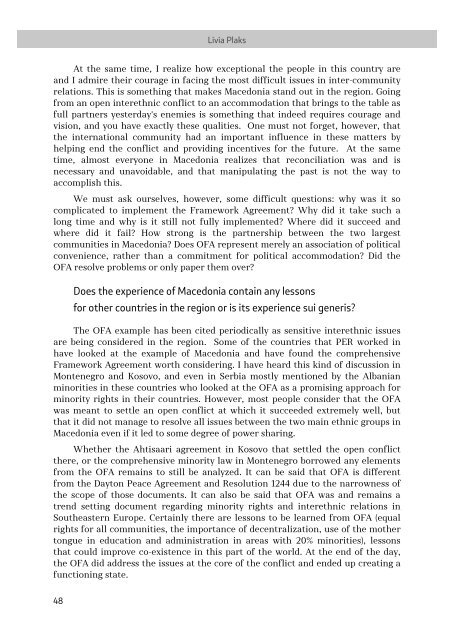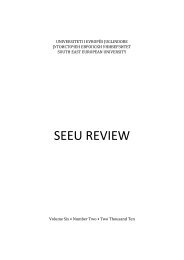Download - South East European University
Download - South East European University
Download - South East European University
You also want an ePaper? Increase the reach of your titles
YUMPU automatically turns print PDFs into web optimized ePapers that Google loves.
Livia Plaks<br />
At the same time, I realize how exceptional the people in this country are<br />
and I admire their courage in facing the most difficult issues in inter-community<br />
relations. This is something that makes Macedonia stand out in the region. Going<br />
from an open interethnic conflict to an accommodation that brings to the table as<br />
full partners yesterday's enemies is something that indeed requires courage and<br />
vision, and you have exactly these qualities. One must not forget, however, that<br />
the international community had an important influence in these matters by<br />
helping end the conflict and providing incentives for the future. At the same<br />
time, almost everyone in Macedonia realizes that reconciliation was and is<br />
necessary and unavoidable, and that manipulating the past is not the way to<br />
accomplish this.<br />
We must ask ourselves, however, some difficult questions: why was it so<br />
complicated to implement the Framework Agreement? Why did it take such a<br />
long time and why is it still not fully implemented? Where did it succeed and<br />
where did it fail? How strong is the partnership between the two largest<br />
communities in Macedonia? Does OFA represent merely an association of political<br />
convenience, rather than a commitment for political accommodation? Did the<br />
OFA resolve problems or only paper them over?<br />
Does the experience of Macedonia contain any lessons<br />
for other countries in the region or is its experience sui generis?<br />
The OFA example has been cited periodically as sensitive interethnic issues<br />
are being considered in the region. Some of the countries that PER worked in<br />
have looked at the example of Macedonia and have found the comprehensive<br />
Framework Agreement worth considering. I have heard this kind of discussion in<br />
Montenegro and Kosovo, and even in Serbia mostly mentioned by the Albanian<br />
minorities in these countries who looked at the OFA as a promising approach for<br />
minority rights in their countries. However, most people consider that the OFA<br />
was meant to settle an open conflict at which it succeeded extremely well, but<br />
that it did not manage to resolve all issues between the two main ethnic groups in<br />
Macedonia even if it led to some degree of power sharing.<br />
Whether the Ahtisaari agreement in Kosovo that settled the open conflict<br />
there, or the comprehensive minority law in Montenegro borrowed any elements<br />
from the OFA remains to still be analyzed. It can be said that OFA is different<br />
from the Dayton Peace Agreement and Resolution 1244 due to the narrowness of<br />
the scope of those documents. It can also be said that OFA was and remains a<br />
trend setting document regarding minority rights and interethnic relations in<br />
<strong>South</strong>eastern Europe. Certainly there are lessons to be learned from OFA (equal<br />
rights for all communities, the importance of decentralization, use of the mother<br />
tongue in education and administration in areas with 20% minorities), lessons<br />
that could improve co-existence in this part of the world. At the end of the day,<br />
the OFA did address the issues at the core of the conflict and ended up creating a<br />
functioning state.<br />
48

















